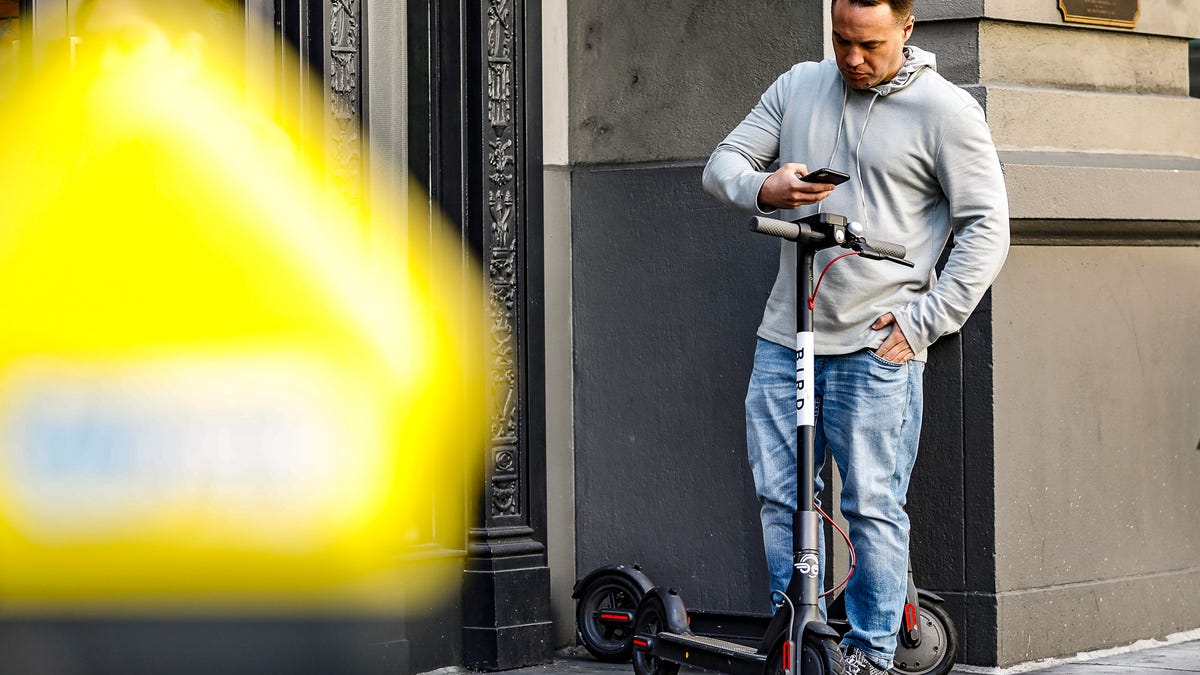Scooter tie-up: Bird acquires Scoot with aims to grow bigger, faster together
Two very different electric scooter companies have united.

Bird was one of the first scooter companies to come to San Francisco. Months later, local regulators banned the company from operating in the city.
Scooter company Bird has acquired smaller scooter and electric moped company Scoot. The two companies said Wednesday that together they'll be able to grow more quickly worldwide and be able to offer more types of electric-assisted vehicles for rent, including scooters, mopeds and bikes.
Bird was the first electric scooter company to hit the US and grew very big, very fast. In less than two years, it went from having scooters just in Santa Monica, California, to being in more than 100 cities in the US and Europe. Scoot has grown much slower. It's offered mopeds for rent in San Francisco since 2012, but it just has operations there and in Barcelona.
Bird CEO and founder Travis VanderZanden said in a statement on Wednesday that his company plans to work with Scoot to "further scale our complementary missions -- to replace car trips with micro-mobility options for all."
While the union between Bird and Scoot appears to make sense, the two companies are very different.
Bird is known for entering new cities by surprise and dropping hundreds of its scooters on streets overnight without forewarning lawmakers or residents. This has wrecked havoc in many cities with people complaining new scooter riders don't follow laws of the road and endanger pedestrians by riding on sidewalks. Residents also say riders leave the scooters wherever they feel like it -- blocking parking spots, bike racks and wheelchair accesses.
In response to the complaints, Bird has appeared to duck responsibility. VanderZanden told CNET in an interview last April that, "it's ultimately up to the riders to follow the rules."
Scoot, on the other hand, has always worked with regulators to get permits beforehand and create programs that take into account safety and parking. Its approach has been to roll out slowly, rather than overwhelming streets with vehicles.
"You've got to figure out how to mash up your techie startup organization with the city... Otherwise you're going to make a big mess," Michael Keating, Scoot's founder and president, told CNET in an interview last May. "We want to be around in 10 or 20 or 100 years... We're not trying to grow as big as we can and flame out."
That type of rule-following was rewarded last August when San Francisco granted Scoot one of only two yearlong permits to operate electric scooters in the city. Bird didn't get a permit and was effectively banned from San Francisco.
Even though Scoot is now owned by Bird, it's still able to operate in the city, according to the San Francisco Municipal Transportation Agency.
The regulator told CNET it approved the transfer of ownership based on Scoot's assurances that it will still meet the goals of San Francisco's permit program. Those efforts include a focus on safety and making sure underrepresented communities have access to scooters.
Under the terms of Bird's acquisition, Scoot will continue to operate as Scoot but as a wholly owned subsidiary of Bird.
"With Bird, our mission remains the same," Keating said in a statement Wednesday. "But the scale at which we will pursue it, and the vehicles we will offer will be so much better for our riders and the cities we serve."
Originally published June 12, 10:31 a.m. PT.
Updates, 12:56 p.m.: Includes additional background information; 5:19 p.m.: Adds information from the San Francisco Municipal Transportation Agency.

